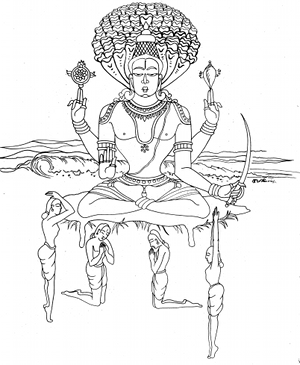What is Yoga?

I-2 Yogaḥ Citta-Vṛtti -Nirodhaḥ - CVN The state called Yoga naturally arises when we continuously practice directing (nirodhaḥ) the cognitive processes (vṛtti-s) of the mind (citta).
In Patanjali’s Yoga Sutra-s (YS), Yoga is defined in terms of sādhana (practice), which results in siddhi-s (powers), and finally Yoga’s ultimate goal, Kaivalyam (Freedom from suffering/misperception/ignorance).
There are four stages of transformation Stage 1 = Understand the mind – Chapter I (Samādhi Pādaḥ)
Stage 2 = Cleanse the body-mind through Patanjali’s 8-limbed practice – Ch II (Sādhana Pādaḥ),
Stage 3 = Use the mind for the meditative process (detach, focus, meditate) and use its powers wisely – Ch III (Vibhūti Pādaḥ)
Stage 4 = Go beyond the mind – move from vidya (knowledge based on logic) to prajna-vivekam (intuition-wisdom) – Ch IV (Kaivalya Pādaḥ)
Lakṣana Sutra – Yoga Defined When most Westerners hear the word Yoga, they think of Cirque du Soleil-like acrobats, performing outrageous contortions of their bodies for the purpose of Enlightenment. But why are these acrobats not Yogi-s? What is the difference between an acrobat and a Yogi/Yogini?
The Yoga Sutra-s are often called Raja Yoga, the King of Yoga practices, meaning practices that focus on the meditative state and finally Freedom as the outcome. A Yogi/Yogini is one who practices concentrating the mind in a positive direction for a sustained period of time. The point of all yogic practices including āsana-s (postural practices) is concentration and meditation. If the practice is not promoting mindfulness and freedom from misperception, it should not be called Yoga.
Vyāsa says our object of meditation must have 3 qualities to bring us to that natural state called Yoga: it must reduce kleśa-s (clouded thinking causing misperceptions, Ch II,3); remove our attachment to the results (phalam) of actions; turn our attention toward nirodhaḥ (that which protects the mind from distractions).
Yajnavalkya defines Yoga from a spiritual point of view. Coming from the root Yuj (union), Yoga is defined as Jivātmā (little human soul/self) uniting with Paramātmā (Big Divine Soul/Self). Vyāsa says, however, you first need Viyoga (separation/detachment) in order to experience Yoga. You need to uncover the Self, not join with it. He says Yoga comes from the word Yujir, to meditate, because the goal is to detach from our bondage to material reality (prakṛti) and to realize we are more than our minds and bodies and re-identify ourselves as Self-Puruṣa – Soul.
Duhkha (suffering) samyogam (well joined/identified with) viyogam (separation/disindentified with/detachment) yogaḥ (is Yoga) – Yoga naturally arises from disidentifying with the suffering we are completely identified with ~Vyasa
For Patanjali, Yoga is NOT defined in a spiritual way but in terms of practice. Yoga is what naturally happens when you practice mindfulness, focussing the mind for a sustained period of time in a positive direction. The focus is on practice NOT belief. It doesn’t matter what you believe in fact. Just practice and see for yourself what you experience. You may or may not call that experience spiritual or not; thus, the birth of the many spiritual/mindfulness paths, describing these Yogic experiences in multifold ways from atheistic to theistic to agnostic.
Yoga Sutra Journal Questions for September How do you experience that state called Yoga in your daily life? How do you undercover your natural state of Happiness and Joy? What activities help you reign in the untamed mind so that you can experience the Joy that naturally arises from that quiet state of body-mind? Can all of these activities promote that state of mind called Yoga? Can they all be considered Yoga practices?
What brings you into the Zone, into the Flow and out of your head? Is it doing “Yoga” practices such as āsana-s (postural practices), prānāyāma (breathing practices), ādhyāya (chanting practices), or dhyāna (meditation practices)? Or is it walking in nature, playing with children, playing music, spending time with your life partner, gardening, playing sports, creating art, cooking, writing, or reading books? Can they all be considered Yoga practices?
